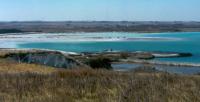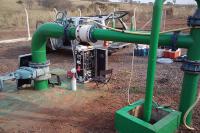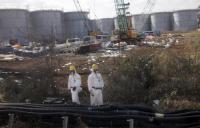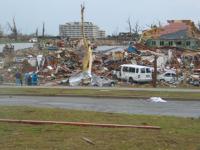-
Appalachian coal ash rich in rare earth elements

In the wake of a 2014 coal ash spill into North Carolina’s Dan River from a ruptured Duke Energy drainage pipe, the question of what to do with the nation’s aging retention ponds and future coal ash waste has been a highly contested topic. A study of the content of rare earth elements in U.S. coal ashes shows that coal mined from the Appalachian Mountains could be the proverbial golden goose for hard-to-find materials critical to clean energy and other emerging technologies.
-
-
Groundwater extraction contributes less to sea level rise than previously thought

Groundwater extraction and other land water contribute about three times less to sea level rise than previous estimates, according to a new study. The study does not change the overall picture of future sea level rise, but provides a much more accurate understanding of the interactions between water on land, in the atmosphere, and the oceans, which could help to improve future models of sea level rise.
-
-
Harnessing solar, wind energy in one device to power the Internet of Things
The “Internet of Things” could make cities “smarter” by connecting an extensive network of tiny communications devices to make life more efficient. But all these machines will require a lot of energy. Rather than adding to the global reliance on fossil fuels to power the network, researchers say they have a new solution.
-
-
New paper filter removes viruses from water

More than 748 million people around the world lack access to safe drinking water and basic sanitation. Water-borne infections are among the global causes for mortality, especially in children under age of five, and viruses are among the most notorious water-borne infectious microorganisms. They can be both extremely resistant to disinfection and difficult to remove by filtration due to their small size. Scientists have developed a simple paper sheet which can improve the quality of life for millions of people by removing resistant viruses from water.
-
-
Rapid detection of E. coli in water
Tragedies like the E. coli outbreak in Ontario’s Walkerton in May 2000 could be averted today with a new invention by researchers at York University that can detect the deadly contaminant in drinking water early. Anew technology has cut down the time taken to detect E. coli from a few days to just a couple of hours.
-
-
Trump-owned resort cites sea level rise in application for seawall permit
Donald Trump may believe that the scientific evidence about global warming is a “hoax,” or the result of a Chinese plot to undermine the American economy, but the professional managers of his coastal properties believe that global warming is real, and that one of its consequences – sea level rise – poses a real threat to the Trump properties they manage.
-
-
Update on earthquakes: Newest results from Oklahoma Commission look “encouraging”
The Oklahoma Corporation Commission (OCC), the regulatory agency overseeing the state’s oil and gas industry, now has data that may suggest their directives to owners of production and induction wells have successfully contributed to a decline in seismic activity in the most volatile areas prone to earthquakes.Scientists at the Oklahoma Geological Survey (OGS) continue to remind the public that there are a wide variety of unanswered questions about immediate and long-term remedies even with the new directives in place.
-
-
Fukushima’s lesson: Better real-time monitoring of spent fuel pools is a must

The 2011 Fukushima Daiichi nuclear accident should serve as a wake-up call to nuclear plant operators and regulators on the critical importance of measuring, maintaining, and restoring cooling in spent fuel pools during severe accidents and terrorist attacks, says a new report from the National Academies of Sciences, Engineering, and Medicine.
-
-
Japanese-language MyShake app crowdsources earthquake-shaking information
UC Berkeley scientists have released a Japanese version of an Android app that crowdsources ground-shaking information from smartphones to detect quakes and eventually warn users of impending jolts from nearby quakes. The app, called MyShake, became publicly available on Sunday. Since it was first released in English on 12 February 2016, more than 170,000 people have downloaded the app from around the world, and on any given day 11,000 phones provide data to the system.
-
-
Improving national resiliency: Joplin tornado 5th anniversary

Disaster struck Joplin, Missouri, on 22 May 2011, when the deadliest and costliest single tornado in U.S. history left a 22-mile long path of destruction. The storm killed 161 people, destroyed some 8,000 structures, and left $2.8 billion in damages in its wake. In the five years since the tragedy, the National Institute of Standards and Technology (NIST) has led the effort to learn from the devastation and make improvements based on those lessons so that communities nationwide can become more resilient to tornadoes, significantly reducing both deaths and property damage.
-
-
Changing land uses in California will drive water needs beyond available supply
If past patterns of California land-use change continue, projected water needs by the year 2062 will increase beyond current supply. If historical trends of land use changes to or from urban, agricultural or other uses continue, the result will be increased water-use demand beyond what existing supplies can provide. Large uncertainties associated with weather and climate variability have the potential to exacerbate the problem.
-
-
Decommissioning Fukushima: Mapping boron distribution in molten debris
Decommissioning the Fukushima Daiichi Nuclear Plant just got one step closer. Japanese researchers have mapped the distribution of boron compounds in a model control rod, paving the way for determining re-criticality risk within the reactor.
-
-
Humans have been causing earthquakes in Texas since the 1920s: Study
Earthquakes triggered by human activity have been happening in Texas since at least 1925, and they have been widespread throughout the state ever since, according to a new historical review of the evidence. The earthquakes are caused by oil and gas operations, but the specific production techniques behind these quakes have differed over the decades.
-
-
With drought easing, California rolls back water conservation rules
California announced on Wednesday that it was rolling back mandatory water conservation rules which were put in place at the height of a 4-year drought. The decision to roll back the restrictions came after water conditions in many parts of the state have improved as a result of a wet winter.
-
-
DHS efforts to address EMP threats to the electric grid fall short: GAO

A report by the Government Accounting Office (GAO) found that as of July 2015, the Department of Homeland Security (DHS) has taken several actions that could help address electromagnetic threats to the electric grid. Although these are positive steps, GAO says that its preliminary work indicates that DHS has not effectively coordinated with stakeholders to identify critical assets or collect necessary risk information, among other responsibilities.
-
- All
- Regional
- Water
- Biometrics
- Borders/Immig
- Business
- Cybersecurity
- Detection
- Disasters
- Government
- Infrastructure
- International
- Public health
- Public Safety
- Communication interoperabillity
- Emergency services
- Emergency medical services
- Fire
- First response
- IEDs
- Law Enforcement
- Law Enforcement Technology
- Military technology
- Nonlethal weapons
- Nuclear weapons
- Personal protection equipment
- Police
- Notification /alert systems
- Situational awareness
- Weapons systems
- Sci-Tech
- Sector Reports
- Surveillance
- Transportation
Advertising & Marketing: advertise@newswirepubs.com
Editorial: editor@newswirepubs.com
General: info@newswirepubs.com
2010-2011 © News Wire Publications, LLC News Wire Publications, LLC
220 Old Country Road | Suite 200 | Mineola | New York | 11501
Permissions and Policies
Editorial: editor@newswirepubs.com
General: info@newswirepubs.com
2010-2011 © News Wire Publications, LLC News Wire Publications, LLC
220 Old Country Road | Suite 200 | Mineola | New York | 11501
Permissions and Policies
